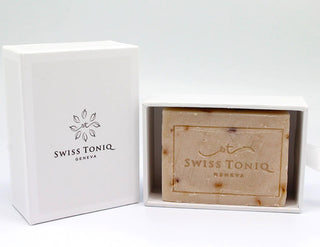Dry, flaky, itchy, red, and irritated skin; the soap you use to clean your face makes a difference. Did you know many commercial bar soaps contain harmful ingredients such as dyes, fragrances, parabens, detergents, sulfates, and even formaldehyde? These are definitely not ingredients that you should be using on your face.
Most soaps on the market can be drying and harsh to gentle facial skin. Instead, your daily skincare routine should include an all-natural moisturising soap to help reverse the ageing process. Whether your facial soap comes in a bar or liquid form, a good facial cleanser should pull the dirt out gently and deliver hydration and nutrients to rebuild your skin’s protective barrier.
The Effects of Using Harsh Soap on Your Face
Over Drying
Even if an over-the-counter soap seems to do a good job of cleansing your face, it will likely also dry out your skin. When facial skin is too dry, this can cause pigmentation, wrinkles, acne, and skin ageing. While some cleansers may work to clear your skin for a couple of days, dry skin produces more oil, which can build up and lead to other issues.
We’ve all been told to drink more water, watch our diets, and use all sorts of creams and oils on our faces to keep moisturised. However, even when you feel like you are doing everything right to stay hydrated, something as simple as the type of face soap you use can sabotage results.
It’s essential to pay attention to what is in your facial cleanser. Chemicals, dyes, and fragrances can be very aggressively drying. Your face soap may be wiping out the lipids in your skin, which are needed for hydration. Extended use of the wrong soap can even cause irreversible dryness and wrinkles. Keeping your facial skin hydrated naturally is the secret to preventing premature ageing.
Damage to Facial Skin
Harsh cleansers can strip away your face’s natural moisturising factors. You wouldn’t use, for example, a washing-up liquid meant for breaking down tough cooking oils on your skin, so why use harsh cleansers on your delicate facial skin?
The outer layer of your skin has a natural barrier that acts as security to keep bad bacteria, toxins, and other harmful substances from moving into your pores and body. The wrong soap can damage this outer barrier, leading to long-term effects such as inflammation, nerve irritation, and itching.
Worsen Skin Conditions
Using the right facial soap is vital for people who suffer from eczema, acne, or other skin conditions. If you’ve dealt with sensitive skin issues, you’ve no doubt noticed that certain soaps and cleansers will leave you red, blotchy, itchy, or even peeling.
Acne can worsen when the skin is clogged with oils and impurities. It may seem like stripping or drying the oil off your face is the answer, but this can make matters worse. Removing natural oils causes your skin to produce more oil, leading to more acne. For those with eczema, harsh soaps weaken the skin barrier, allowing toxins to reach deeper into the skin and worsening the condition.
What to Use Instead
Instead of harsh commercial cleansers, look for all-natural moisturising soaps. For example, try Swiss Toniq’s Moisturising Aloe Vera and Jasmine Cream Soap. This soap is made from highly concentrated, unrefined plant-derived ingredients and essential oils that gently remove dirt without stripping the skin. It is packed with nutrients to help rebuild the skin’s protective barrier and deliver hydration. The difference between using totally natural skincare products made from concentrated, raw plant ingredients and those that use harsh, chemical detergents can easily be seen in clear, hydrated skin.
How to Wash Your Face
Once you’ve made the switch to an all-natural moisturising facial soap, you’ll want to use it correctly. Washing your face with lukewarm water is crucial, and you should ideally only wash your face at the end of the day. After a good night's sleep your skin will still be clean and will have produced some wonderful natural oils to protect your skin biome. Upon waking, simply splash some water on your face to preserve these helpful oils.
When you’re ready to wash with clean, warm water, lather up your hands with the soap. Massage this lather over your face, and don’t forget your neck. You will not need to over-rinse when using a nutrient-rich natural soap, as the oils absorbed into your skin are beneficial. Pat semi-dry with a clean towel. After cleansing, always remember to apply a high-quality, all-natural moisturiser or serum and apply it to damp skin or even slightly wet skin, not dry. Keeping the skin somewhat moist will give it an extra drink before the moisturiser seals this water in.
You may be surprised that the facial cleanser in your cabinet that claims to be natural and organic may actually contain harmful chemicals and detergents. That’s why it’s vital to pay attention to ingredients. For the delicate skin on your face, look for soap made from unrefined and unprocessed plant-based ingredients that effectively moisturise and won’t dry out or cause damage to your skin’s protective barrier. Seek out ingredients such as Shea butter and Cocoa butter for more nutrients and hydration. These natural oils provide much more value than the standard “vegetable oil.”




